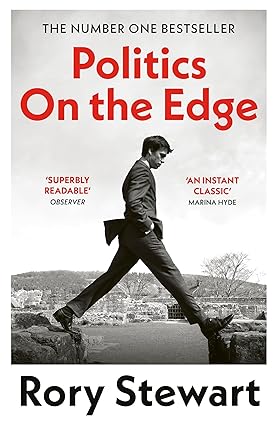
Politics on the Edge
Rory Stewart
About the Author

Rory Stewart
Questions & Answers
During Rory Stewart's tenure, the British government and Parliament faced several key challenges and criticisms:
-
Political Dysfunction: The government was criticized for its lack of seriousness, poor decision-making, and the prioritization of political posturing over effective governance. This environment impacted Stewart's career, leading to his resignation from the Conservative Party over disagreements with Boris Johnson's leadership.
-
Brexit: The Brexit process was fraught with controversy, with the government's handling of it being particularly scrutinized. Stewart's stance against a no-deal Brexit and his focus on the complexities of the Irish border issue during debates were seen as too nuanced for some, potentially costing him the Conservative Party leadership.
-
Media Influence: The British media was accused of being biased and sensationalist, which affected the perception of politicians like Stewart. His candidness and willingness to challenge the status quo often led to criticism and media scrutiny.
-
Party Unity: Stewart's political career was also impacted by the internal dynamics of the Conservative Party. His calls for unity and moderation were sometimes seen as a threat to the party's right-wing base, leading to criticism and a lack of support from some colleagues.
These challenges and criticisms led Stewart to reevaluate his beliefs in the British political system. He became more critical of the system's ability to govern effectively and its focus on short-term political gain over long-term policy solutions. This shift influenced his decision to leave the Conservative Party and pursue a more independent political path.
Rory Stewart's background in international development and his experiences in Afghanistan significantly influenced his governance and policy-making approach in the UK. His firsthand exposure to complex political situations, particularly in Afghanistan, instilled in him a nuanced understanding of the challenges of nation-building and foreign intervention. This experience led him to advocate for a more measured and realistic approach to international engagement, emphasizing the importance of understanding local contexts and the limitations of external influence.
In the UK, Stewart's approach reflected his belief in the importance of local knowledge and community engagement. His tenure as Minister of State for International Development saw him push for transparency and effectiveness in aid programs, acknowledging the need for honesty about successes and failures. His time as Prisons Minister demonstrated his commitment to improving conditions within the prison system, drawing on his experience in Afghanistan and his belief in the transformative power of structure and discipline. Overall, Stewart's background and experiences shaped a governance style that prioritized practicality, humility, and a focus on long-term, sustainable solutions.
Rory Stewart views technology, particularly big data and social media, as a significant force in modern political campaigns. He acknowledges the effectiveness of these tools in the 2015 general election, attributing the Conservative Party's victory to Jim Messina's use of Facebook, Twitter, and sophisticated data analytics. However, Stewart expresses concerns about the potential for manipulation and the dehumanizing aspects of such campaigns. He criticizes the reliance on consumer data and algorithms to target voters, suggesting it can lead to superficial and manipulative campaigns. Despite these concerns, he acknowledges the transformative impact of technology on political engagement and communication.
Rory Stewart navigated the complex dynamics within the Conservative Party by focusing on policy and values, particularly emphasizing the need for a "One Nation" approach. During the 2019 leadership election, he faced criticism and attacks from various quarters, including accusations of being a "liar" and a "huckster." Despite this, Stewart maintained his stance on Brexit, advocating for a deal rather than a no-deal scenario, and criticized Boris Johnson's leadership style.
Key lessons from Stewart's experience include:
-
Policy and Values Over Personal Attacks: Stewart's focus on policy and values, rather than engaging in personal attacks, demonstrated that a candidate can gain support based on substance rather than mudslinging.
-
Unity and Inclusion: His emphasis on a "One Nation" approach, aiming to unite the party and the country, showed the importance of inclusivity and consensus in political leadership.
-
Media and Public Perception: Stewart's experience highlights the power of media in shaping public perception and the need for strong communication strategies to counter negative narratives.
-
Resilience and Determination: Despite setbacks and criticism, Stewart's resilience and determination to stand by his principles and policies are commendable, showing the importance of staying true to one's beliefs in politics.
Rory Stewart's recommendations for improving the British political system and addressing the challenges he encountered are multifaceted:
-
Empower Backbenchers: He advocates for giving backbenchers more influence and decision-making power, as they are often the ones who understand the nuances of local issues and can offer valuable insights.
-
Enhance Local Expertise: He suggests increasing the number of staff with local expertise in remote areas, particularly in international development, to better understand and address the needs of the communities they serve.
-
Streamline Decision-Making: He emphasizes the need for a more streamlined and efficient decision-making process, especially in departments like international development, where resources are vast but often underutilized due to bureaucratic hurdles.
-
Renationalize Services: He advocates for renationalizing services where privatization has failed, such as in the prison system, to ensure better quality and accountability.
-
Focus on Basic Standards: In the case of prisons, he emphasizes the importance of focusing on basic standards like cleanliness, safety, and rehabilitation, rather than just reducing prison populations.
-
Promote Transparency and Accountability: He advocates for greater transparency and accountability in government, particularly in the use of public funds and the decision-making process.
-
Address Political Polarization: He calls for a more inclusive approach to politics, emphasizing the need to address the growing polarization in British politics and work towards a more unified approach to governance.